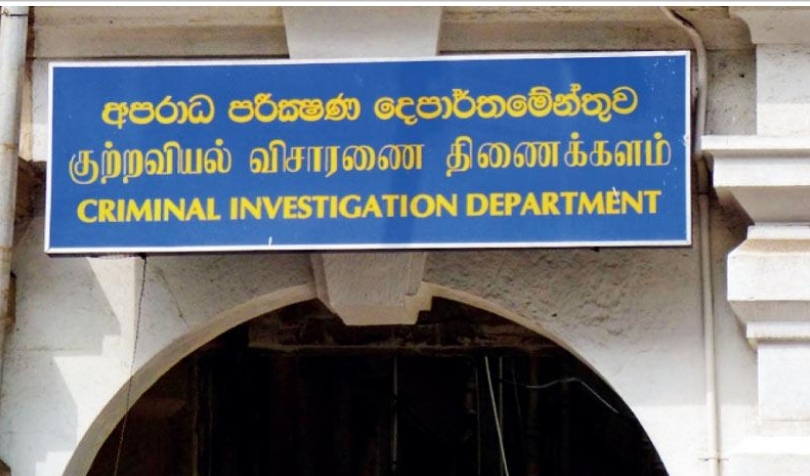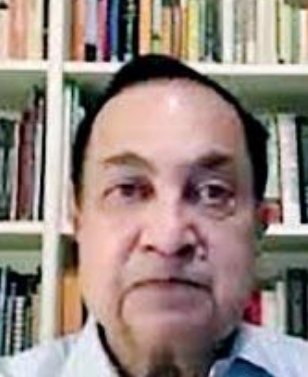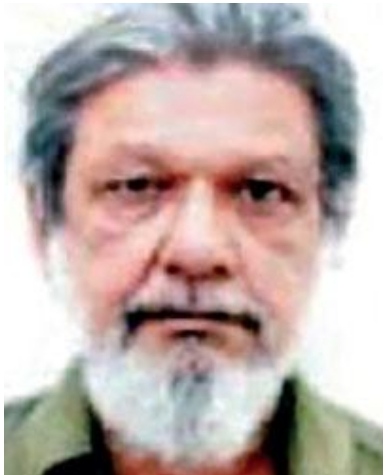PART 2 : How I Went on a Hunger Strike in CID Custody on the 4th Floor
By D B S Jayaraj
This is the second part of the article How I was Arrested by the CID…published last week

CID Head Quarters also known as the Fourth Floor
I had in my pocket a brooch with a Sikh emblem and I was worried that the cops might identify it. When the Policeman asked me what the brooch was I deadpanned “Tie Pin” and so it was recorded as a “Tie Pin”. The Policeman did not bother to think as to why I had a “Tie Pin” while not wearing a tie
He confirmed that he had indeed been informed by the CID and that he had informed my family and close friends of the position. He also told me that ‘Hindu’ associate editor N. Ram too had been informed through Dr Neelan Tiruchelvam
As stated last week, the CID director DIG Bennet Perera showed me the letter written by Defence Secretary Gen. Sepala Attygalle instructing the Police to question me for information regarding the murder of four Rupavahini employees in Jaffna.
I immediately told the DIG that I did not know anything about the Rupavahini killings beyond what had been already reported in newspapers.
I also said the matter had not been discussed with the then LTTE deputy leader Mahathaya when I was interviewing him.
DIG Bennet Perera responded by saying that I would have to make a detailed statement about related matters such as my trip to Jaffna and interview with Mahathaya. I replied that
I was a professional journalist, who had absolutely nothing to hide from the law enforcement authorities. I said that I could make a full statement about my Jaffna visit without divulging my sources.
I suggested that I be allowed to go home and return the following day to make a statement with either the Island Editor or another Senior Journalist in attendance. My suggestion was turned down.
I was then told that I had to stay overnight at Police Headquarters and that my statement would be recorded the following morning. I said that Gen. Attygalle’s letter had not instructed the Police to detain me.
The CID Director replied that they the CID were the best judge of deciding as to how information was going to be elicited from me. I was also told that I was going to be detained temporarily under the Emergency Regulations.
At that point, I got agitated a little and asked the DIG for a lawyer or my editor to be present at my interrogation. The reply was that I was not going to be interrogated but would merely be asked to clarify matters. I again asked for a lawyer but was refused. DIG Bennet Perera said the recording of the statement was not going to take much time and I would be free to go in the morning.
I insisted then that I should be given a telephone call as I wanted to inform the Island Editor. The DIG said that the Editor had been informed and that I need not be given a call.
I then asked DIG Perera why the CID had resorted to the elaborate ruse of pretending to be JVP when they could have been straightforward and introduced themselves as Policemen. The reply was that in a previous experience with a well-known journalist whom the CID had to question, they had had a bad experience. The journalist in question had pretended to be his cousin and had eluded them for several days. That was why the CID first posed as the JVP with me, I was told.
Subsequently, when I was being questioned by the CID I was repeatedly asked the question whether I had JVP links and what I thought of an LTTE -JVP political alliance. So, I suspect that the JVP pretence ruse had more to it than what had been said.
Two Amusing Things
I was taken from the DIG’s office to the infamous fourth floor and formally detained. I had to hand over all my possessions to a Policeman who dutifully recorded everything. Two amusing things happened.
I had in my pocket a brooch with a Sikh emblem. This was pinned by Sikh soldiers on their turbans. Mahaththaya had distributed some of these taken from dead Sikh soldiers to some of the Journalists in Jaffna. I also got one. I had brought it to the office to show a friend on the Island.
Now this was in my pocket and I was worried that the cops might identify it. When the Policeman asked me what the brooch was I deadpanned “Tie Pin” and so it was recorded as a “Tie pin”. The Policeman did not bother to think as to why I had a “Tie pin” while not wearing a tie.
The other amusing thing was that I had some Vitamin B complex capsules in my pocket as well. When the cop saw it he became excited.
“What are these? cyanide capsules? he asked me in Sinhala.
I realised that being a Tamil he was viewing me as a Tiger and suspected that I was carrying such capsules. I told him that they were Vitamin B capsules but he did not seem convinced and asked whether he could throw them into the waste paper basket. I agreed and so the Vitamin – Cyanide capsules were dumped.
I was then taken to a room. It was a routine office room. The telephone extension there was disconnected. Later I was given a rice parcel to eat and asked to sleep in the same room. A Police Constable in civvies was guarding me and would accompany me to the toilet.
The room that I was placed in had charts of the names of alleged Tamil terrorists and the movements to which they belonged. They were pasted on the walls. There were several errors in those. I pointed them out to my ‘guardian’ Policeman who got upset and said “Don’t say these things. Mind your own business”.
There was also a very large roadmap plastered on the wall. When I tried to do some map reading the Policeman became uncomfortable and said “Don’t do this. Just go and sit”. I complied.
I started conversing with the Policeman. It was quite pleasant. The fact that I could speak Sinhala reasonably well helped to communicate. My credentials as a journalist attached to the English sister of the Popular Sinhala Divaina newspaper also helped.
Another factor was that my family was then residing in Kurunegala and therefore I was not considered as being from Jaffna.
Panoramic Harbour View
There was no bed to sleep on. I sat for a long time by the window which overlooked the harbour. It was a panoramic view with a myriad of lights. One had to pay a cover charge to get the same view at the harbour view room at the then Taprobane Hotel and here I was getting it free.
Finally, I took a cushion from one of the chairs, placed it on a table, climbed on it and went to sleep.
I started conversing with the Policeman. It was quite pleasant. The fact that I could speak Sinhala reasonably well helped to communicate. My credentials as a journalist attached to the English sister of the Popular Sinhala Divaina newspaper also helped

Former Hindu Editor N.Ram

Former Island Editor Gamini Weerakoon
I did not sleep well at all mainly because of anxiety. I was deeply troubled by the thought that no one could know about my plight. I did not believe that the Police had informed the Editor Gamini Weerakoon. Since they were refusing me a telephone call I feared the worst. While I was tossing and tuning on the table the Policeman guarding me was dozing comfortably in his chair.
At dawn, the Police Constable told me that the waterflow in the toilet pipes was heavy in the morning. I could bathe but I had no towel, soap or change of clothing. Still, I wanted a bath. There was no bathing bucket. Improvising, I washed the toilet bucket well and then filled it and began pouring the water on my body. After bathing there was no towel to dry myself and I got into my dirty crumpled clothes again in a wet state. I could not shave myself too.
I found that my detention room by night was actually an office room by day and that civilian Police personnel worked there.
I was given a string-hopper parcel and plain tea for breakfast. I tucked in. Thereafter I kept on requesting a telephone call. Also, no one seemed interested in recording my statement.
My repeated requests that I meet with Senior Police Officers were also ignored. I was merely asked to sit at the desk by the window and gaze. My request for a newspaper was also not heeded.
I was beginning to get more and more worried that I was going to be held indefinitely without the outside world knowing. So, I decided to do something and rectify the situation.
Rasiah Partheeban alias Thileepan of LTTE’s “fast unto death “fame was my inspiration. I decided to go on a hunger strike.
Refusal to Eat Lunch
At noon I was given a parcel of rice and curries for lunch. Instead of eating it as was expected, I refused to eat it. When the Police Constable guarding me queried as to why I was not eating, my reply was that my statement was not being recorded and that I was not being given a telephone call to inform my Editor and as such I was not in a mood to eat.
To emphasise my state of mind I folded my arms and placed my face downwards on the desk. A little later some more Constables came and asked me to eat saying that the recording of the statement would commence as soon as I finished eating. I politely refused saying I wanted a telephone call.
Then one of the Police Inspectors who arrested me came and wanted me to eat but I said I wanted a telephone call. After some time I was taken to another room where everything was in place for the recording of my statement. I was told that I was delaying matters unnecessarily by refusing to eat.
“Recording your statement is going to take some time so you had better eat because you are going to be here tonight also” I was told.
At that point, I stressed that I must be allowed to speak to the Island Editor.
Again I was told that he had been informed but I insisted that I should be able to speak to him directly and confirm it. Despite the pressure I continued to maintain that I would not be in a position to eat and make a statement or answer questions until and unless I was allowed to speak to the Editor directly.
I was not abrasive when I asserted my position but very mild-mannered and polite. This helped to minimise the irritation that the Police officers were feeling at my attitude. After a great deal of talk, I was asked to go back to my original room of incarceration.
I continued to remain at my desk with my face buried in my folded arms. I was woken up time and again by some civilian female personnel who gently admonished me for refusing to eat and entreated me to do so.
I was touched by their behaviour but declined politely to do so.
Two-Minute Telephone Call
After a long lull, I was taken to the CID Director’s Office where the top man blew his top at me.
“What is this? Are you trying to do a Thileepan here and put us all in jeopardy?” Bennet Perera rasped.
Once again I explained my position politely. Finally, DIG Perera yielded and instructed his subordinates to get the Island Editor online “Only two minutes” he barked and kept on listening to the conversation on the extension.
I think Island Editor Gamini Weerakoon’s gruff voice never sounded sweeter to me than on that fateful day.
He confirmed that he had indeed been informed by the CID and that he had informed my family and close friends of the position. He also told me that ‘Hindu’ associate editor N. Ram too had been informed through Dr. Neelan Tiruchelvam.
The Island Police Beat reporter Jehan Haniff will be in touch with the 4th Floor guys constantly on your matter he said. Asking me not to worry ‘Gamma’ began telling me of certain politicians and lawyers who were interceding on my behalf when the phone was yanked out of my hand. My time was over.
I went back to the Interrogation Room refreshed in spirit. My lunch parcel had turned cold but I was given a bun, plantain and tea and my brief imitation of Thileepan was over.
The recording of my statement commenced on Tuesday, October 27 afternoon. Before the questioning began there was a minor hitch when the Police officers said that the questioning had to be conducted in Sinhala and that the statement would be recorded in Sinhala too.
I said I was not very competent in Sinhala and that I would prefer English. They said that was not possible.
So, I then demanded that it should be recorded in Tamil according to my Constitutional Rights. The reply was that they were short of personnel proficient in the Tamil language and that I may have to wait indefinitely.
Recording Statement in English
I said that was all right and again expressed the view that it would be mutually beneficial if the statement was recorded in English. The officers went out and returned presumably after consulting higher-ups and beamed.
“It is English then,” they said.
The recording of my statement began. What happened thereafter will be related in the third part of this article next week.
Daily Mirror




